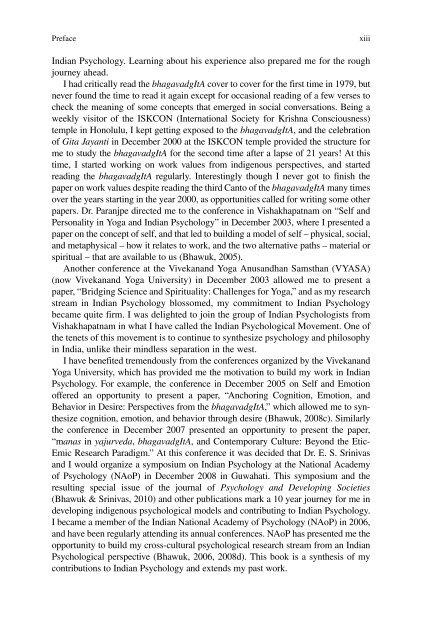Spirituality and Indian Psychology: Lessons from ... - Mandhata Global
Spirituality and Indian Psychology: Lessons from ... - Mandhata Global
Spirituality and Indian Psychology: Lessons from ... - Mandhata Global
You also want an ePaper? Increase the reach of your titles
YUMPU automatically turns print PDFs into web optimized ePapers that Google loves.
Preface<br />
<strong>Indian</strong> <strong>Psychology</strong>. Learning about his experience also prepared me for the rough<br />
journey ahead.<br />
I had critically read the bhagavadgItA cover to cover for the first time in 1979, but<br />
never found the time to read it again except for occasional reading of a few verses to<br />
check the meaning of some concepts that emerged in social conversations. Being a<br />
weekly visitor of the ISKCON (International Society for Krishna Consciousness)<br />
temple in Honolulu, I kept getting exposed to the bhagavadgItA, <strong>and</strong> the celebration<br />
of Gita Jayanti in December 2000 at the ISKCON temple provided the structure for<br />
me to study the bhagavadgItA for the second time after a lapse of 21 years! At this<br />
time, I started working on work values <strong>from</strong> indigenous perspectives, <strong>and</strong> started<br />
reading the bhagavadgItA regularly. Interestingly though I never got to finish the<br />
paper on work values despite reading the third Canto of the bhagavadgItA many times<br />
over the years starting in the year 2000, as opportunities called for writing some other<br />
papers. Dr. Paranjpe directed me to the conference in Vishakhapatnam on “Self <strong>and</strong><br />
Personality in Yoga <strong>and</strong> <strong>Indian</strong> <strong>Psychology</strong>” in December 2003, where I presented a<br />
paper on the concept of self, <strong>and</strong> that led to building a model of self – physical, social,<br />
<strong>and</strong> metaphysical – how it relates to work, <strong>and</strong> the two alternative paths – material or<br />
spiritual – that are available to us (Bhawuk, 2005).<br />
Another conference at the Vivekan<strong>and</strong> Yoga Anus<strong>and</strong>han Samsthan (VYASA)<br />
(now Vivekan<strong>and</strong> Yoga University) in December 2003 allowed me to present a<br />
paper, “Bridging Science <strong>and</strong> <strong>Spirituality</strong>: Challenges for Yoga,” <strong>and</strong> as my research<br />
stream in <strong>Indian</strong> <strong>Psychology</strong> blossomed, my commitment to <strong>Indian</strong> <strong>Psychology</strong><br />
became quite firm. I was delighted to join the group of <strong>Indian</strong> Psychologists <strong>from</strong><br />
Vishakhapatnam in what I have called the <strong>Indian</strong> Psychological Movement. One of<br />
the tenets of this movement is to continue to synthesize psychology <strong>and</strong> philosophy<br />
in India, unlike their mindless separation in the west.<br />
I have benefited tremendously <strong>from</strong> the conferences organized by the Vivekan<strong>and</strong><br />
Yoga University, which has provided me the motivation to build my work in <strong>Indian</strong><br />
<strong>Psychology</strong>. For example, the conference in December 2005 on Self <strong>and</strong> Emotion<br />
offered an opportunity to present a paper, “Anchoring Cognition, Emotion, <strong>and</strong><br />
Behavior in Desire: Perspectives <strong>from</strong> the bhagavadgItA,” which allowed me to synthesize<br />
cognition, emotion, <strong>and</strong> behavior through desire (Bhawuk, 2008c). Similarly<br />
the conference in December 2007 presented an opportunity to present the paper,<br />
“manas in yajurveda, bhagavadgItA, <strong>and</strong> Contemporary Culture: Beyond the Etic-<br />
Emic Research Paradigm.” At this conference it was decided that Dr. E. S. Srinivas<br />
<strong>and</strong> I would organize a symposium on <strong>Indian</strong> <strong>Psychology</strong> at the National Academy<br />
of <strong>Psychology</strong> (NAoP) in December 2008 in Guwahati. This symposium <strong>and</strong> the<br />
resulting special issue of the journal of <strong>Psychology</strong> <strong>and</strong> Developing Societies<br />
(Bhawuk & Srinivas, 2010) <strong>and</strong> other publications mark a 10 year journey for me in<br />
developing indigenous psychological models <strong>and</strong> contributing to <strong>Indian</strong> <strong>Psychology</strong>.<br />
I became a member of the <strong>Indian</strong> National Academy of <strong>Psychology</strong> (NAoP) in 2006,<br />
<strong>and</strong> have been regularly attending its annual conferences. NAoP has presented me the<br />
opportunity to build my cross-cultural psychological research stream <strong>from</strong> an <strong>Indian</strong><br />
Psychological perspective (Bhawuk, 2006, 2008d). This book is a synthesis of my<br />
contributions to <strong>Indian</strong> <strong>Psychology</strong> <strong>and</strong> extends my past work.<br />
xiii

















